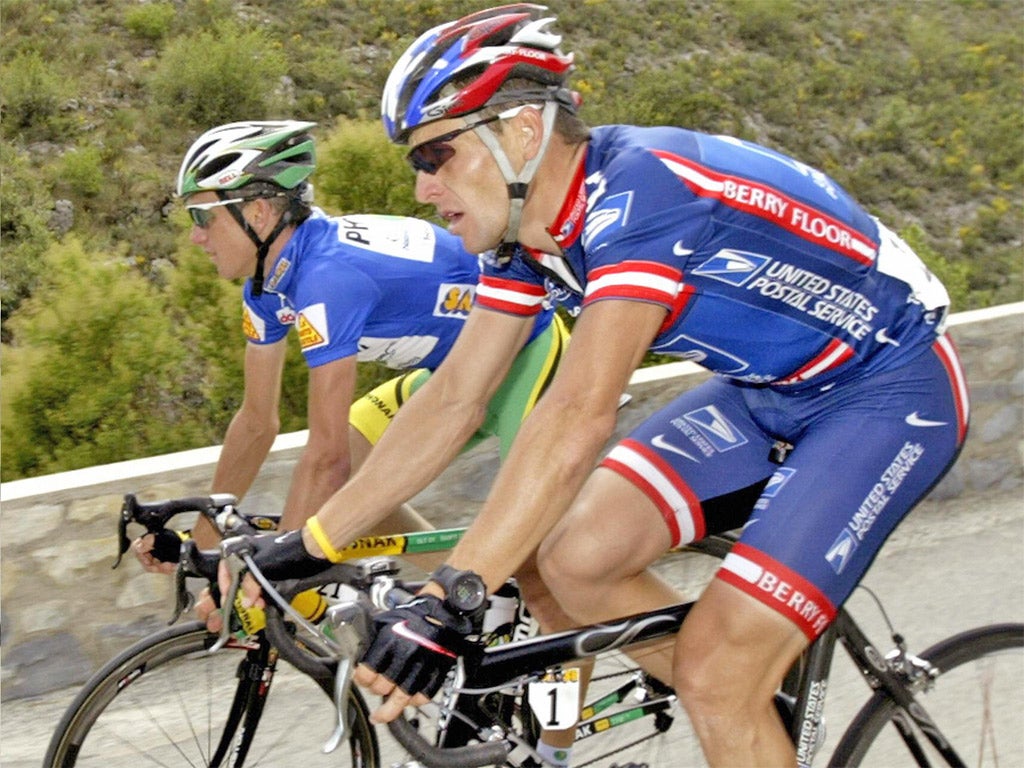James Lawton: Casual attitude to doping the most shocking aspect of allegations against seven-time Tour de France winner Lance Armstrong
There, lined up like milk cartons, were neatly wrapped supplies of EPO

You think you might just have seen and heard it all, the good and the bad and in the latter case this is maybe especially so if you happened to be in Seoul in 1988 when Ben Johnson, broken and yellow-eyed after first taking us to the stars, was unmasked as one of sport's ultimate cheats.
Or perhaps you were at the peak of Alpe d'Huez 10 years earlier when the Belgian rider Michel Pollentier had his yellow jersey removed after they found a condom filled with uncontaminated urine in his armpit, from where a tube ran down for the purpose of passing a fake sample.
But of course you haven't, seen the worst of it that is, because there is always something else around the corner if the rewards are high enough and the risks deemed acceptable.
We are reminded of this in the most gut-wrenching way with the latest allegations against Lance Armstrong, who once said that in his mind the only way to equate losing, either a race or the greatest argument of his life, was with death.
Armstrong's decision to end his fight against accusations that he systematically doped his way to seven Tour de France titles, and the announcement of the US Anti-Doping Agency that it plans to strip the Texan of "all results" from 1 August 1998, are certainly given a still more shocking context by the charges of his former US Postal Service team-mate Tyler Hamilton in the first published extracts of his memoir from a version of sports hell, The Secret Race.
Most haunting is the casual language of deceit. "Buddy, can you spare a dime?" was the anguished cry of the American Depression.
Now Hamilton offers us a line that will surely linger as long as the possibility of an ultimate scandal of sport is remembered. He claims that he said it in Armstrong's villa in Nice after fretting over his need for performance-enhancing substances on a transatlantic flight into a new European season. "Hey dude," Hamilton recalls saying to Armstrong, "have you got any Poe I can borrow?"
Poe? It is the trade nickname for EPO or erythropoietin. Edgar Allan Poe, of course, was a great if somewhat macabre American poet. His name, Hamilton tells us, has become just another phrase in the language of cheating folk.
According to Hamilton, who is just one of 10 witnesses the USADA arraigned against Armstrong before he made his No Mas declaration, his team-mate casually pointed to the fridge. There, lined up like so many cartons of milk, were the neatly wrapped supplies of EPO to be injected when the time was right.
In the quaintest way, Hamilton was shocked by the sheer brazenness, reporting, "I was surprised that Lance would be so cavalier. On the occasions I had kept EPO in my fridge in Girona [his training base in Spain] I had taken it out of the cardboard packaging, wrapped it in foil and put it in the back, out of sight. But Lance seemed relaxed about it. I figured he knew what he was doing. I took a vial and thanked him."
What Armstrong was doing, it appeared to Hamilton, was making sure, in the wake of the Festina bust, when that team had a cache of drugs discovered by the police in a team vehicle, that he was guaranteed uninterrupted delivery of the right medicine. Hamilton claims that Armstrong had two ruling mantras. One said, "Whatever you do, those f***ers [rivals] are doing more." The other proclaimed, "We're going to f***ing throttle everybody."
Along with the expletives, there were the routine obscenities of a sporting life shaped by a swaggering confidence that drug testing could be beaten.
Hamilton reports that Armstrong, aware that the goods could no longer be carried by the team, was exultantly confident in his own supply system. His gardener and odd-jobs man had a new chore and some new tools – a motorbike and a cellphone. He could be summoned at any time day or night, he could be in and out and back tending the flowers in simply no time at all, and one neat way of removing the evidence was slipping the used syringes into a soft drinks can and dropping it into the back pack of the house disposer.
This didn't remove all risk, of course, and Hamilton recounts the time he and his partner were obliged to crawl along the floor of their house while avoiding a dope tester. The most important safeguard of all, we are told, was to know your "glow-time" – or that period when you couldn't be sure the drugs had cleared your system. That was the difference between opening your door and crawling into a closet.
The difference, if you like, between a hero and a skulking cheat or even a line from an old poet and the kind of graffiti that you have to worry may never wipe clean.
Subscribe to Independent Premium to bookmark this article
Want to bookmark your favourite articles and stories to read or reference later? Start your Independent Premium subscription today.

Join our commenting forum
Join thought-provoking conversations, follow other Independent readers and see their replies